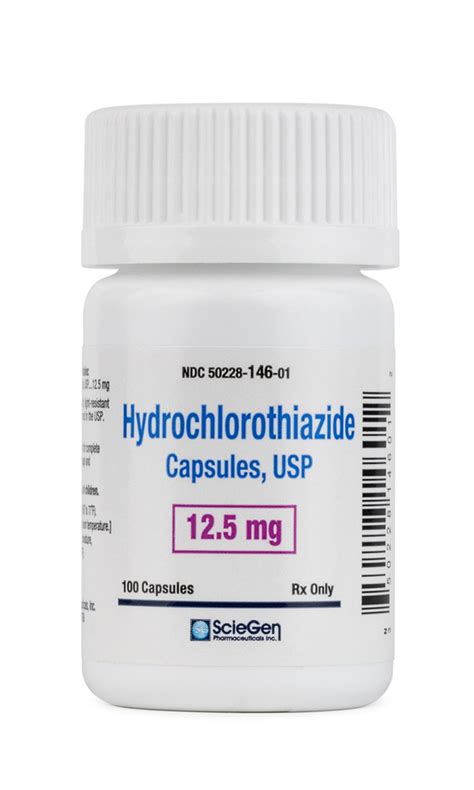Intro
Discover the versatile uses of Hydrochlorothiazide, a diuretic medication, including treating hypertension, edema, and kidney diseases, while managing conditions like nephrotic syndrome and congestive heart failure.
Hydrochlorothiazide, commonly referred to as HCTZ, is a diuretic medication that has been widely used in the medical field for several decades. It belongs to the class of thiazide diuretics, which work by helping the kidneys remove excess fluid from the body through urine. This process can help lower blood pressure and reduce swelling in the body. The importance of understanding hydrochlorothiazide's uses cannot be overstated, as it is a medication that affects millions of people worldwide. Its applications are diverse, ranging from the management of hypertension to the treatment of edema. By exploring the various uses of hydrochlorothiazide, we can better appreciate its role in modern medicine and its potential benefits for individuals suffering from certain health conditions.
The versatility of hydrochlorothiazide is evident in its ability to address a range of medical issues. From its primary use in managing hypertension to its application in treating conditions like edema and nephrogenic diabetes insipidus, hydrochlorothiazide has proven to be a valuable tool in the medical arsenal. Moreover, its use in conjunction with other medications to enhance their effectiveness underscores its importance in combination therapy. As we delve into the specifics of hydrochlorothiazide's uses, it becomes clear that this medication plays a critical role in the treatment and management of various health conditions, making it an essential component of modern healthcare.
The significance of hydrochlorothiazide in medical treatment is further highlighted by its widespread prescription and use. Healthcare providers often prescribe hydrochlorothiazide due to its efficacy, relatively low cost, and the extensive body of research supporting its safety and effectiveness. As a result, understanding the uses, benefits, and potential side effects of hydrochlorothiazide is crucial not only for healthcare professionals but also for patients who are prescribed this medication. By educating oneself about hydrochlorothiazide, individuals can better navigate their treatment plans, make informed decisions about their health, and work more effectively with their healthcare providers to manage their conditions.
Introduction to Hydrochlorothiazide

Pharmacological Mechanism
The pharmacological mechanism of hydrochlorothiazide involves the inhibition of the sodium-chloride symporter in the kidneys, which is responsible for the reabsorption of sodium and chloride ions. By blocking this symporter, hydrochlorothiazide increases the excretion of these ions, leading to increased urine production. This diuretic effect is beneficial in conditions characterized by excessive fluid retention, such as hypertension and edema. Furthermore, the reduction in blood volume and cardiac preload can decrease the workload on the heart, contributing to the medication's antihypertensive effects.Uses of Hydrochlorothiazide

Treatment of Hypertension
One of the primary uses of hydrochlorothiazide is in the management of hypertension. By reducing blood volume and decreasing peripheral resistance, hydrochlorothiazide helps lower blood pressure. It is often used as a first-line treatment for hypertension, either as monotherapy or in combination with other antihypertensive medications. The choice of hydrochlorothiazide in hypertension management is influenced by its efficacy, safety profile, and cost-effectiveness.Treatment of Edema
Hydrochlorothiazide is also used in the treatment of edema associated with congestive heart failure, hepatic cirrhosis, and nephrotic syndrome. Its diuretic effect helps reduce fluid accumulation in the body, thereby alleviating swelling and improving symptoms. In these conditions, hydrochlorothiazide may be used alone or in combination with other diuretics to achieve the desired therapeutic effect.Benefits and Side Effects

Practical Considerations
When prescribing hydrochlorothiazide, healthcare providers must consider several practical aspects, including the patient's medical history, current medications, and potential interactions. For example, hydrochlorothiazide can interact with nonsteroidal anti-inflammatory drugs (NSAIDs), reducing its efficacy, and can also increase the risk of lithium toxicity when co-administered with lithium. Therefore, careful patient evaluation and monitoring are essential to ensure the safe and effective use of hydrochlorothiazide.Combination Therapy

Statistical Data and Examples
Numerous clinical trials and observational studies have demonstrated the efficacy of hydrochlorothiazide in various conditions. For example, the Antihypertensive and Lipid-Lowering Treatment to Prevent Heart Attack Trial (ALLHAT) showed that hydrochlorothiazide was as effective as other antihypertensive medications in reducing the risk of cardiovascular events. Such evidence supports the use of hydrochlorothiazide as a first-line treatment for hypertension and highlights its role in managing other conditions where diuretic therapy is beneficial.FAQs

What is hydrochlorothiazide used for?
+Hydrochlorothiazide is used to treat hypertension, edema, and nephrogenic diabetes insipidus by helping the kidneys remove excess fluid from the body.
How does hydrochlorothiazide work?
+Hydrochlorothiazide works by inhibiting the reabsorption of sodium and chloride in the kidneys, leading to increased urine production and a decrease in blood volume.
What are the common side effects of hydrochlorothiazide?
+Common side effects of hydrochlorothiazide include hypokalemia, hyperglycemia, and increased uric acid levels. These side effects are usually mild and reversible.
In conclusion, hydrochlorothiazide is a versatile medication with a range of applications in modern medicine. Its efficacy, safety, and cost-effectiveness make it a valuable tool in the management of hypertension, edema, and other conditions. As healthcare continues to evolve, understanding the uses, benefits, and potential side effects of hydrochlorothiazide will remain essential for both healthcare providers and patients. By staying informed and engaged, individuals can work more effectively with their healthcare teams to manage their conditions and improve their overall health and well-being. We invite you to share your thoughts, questions, or experiences with hydrochlorothiazide in the comments below, and to consider sharing this article with others who may benefit from this information.
